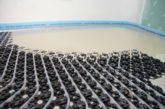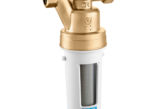
Rob Berridge presents his personal take on COP26, the Heat in Buildings Strategy, and the lack of a universally-adopted controls protocol.
The Heat in Buildings Strategy, released a couple of months ago, has transpired into yet another ‘public lip service’ exercise – and those of us in the industry saw through its gaping holes. We assumed that sealing these holes would be the focus. Instead the focus is on new technologies and future developments, not tackling energy waste in the here and now.
Sure, there is always compromise and pragmatism in all political foraging for truth, yet as Europe’s worst performing building capital (3°C heat loss in every five hours) and the sixth largest economy in the world, I’m slightly perplexed that we are still paralysed through lobbied policy, self-interest and poor accountability to Building Regulations.
I’m also dismayed by COP “whatever number we’re up to now” virtue signalling, and frankly disgusted that the status quo lurches like a rudderless ship in a storm as opposed to sailing collectively into the wind and unilaterally tackling energy wastage right now through robust building decree, very simple hydronic balancing and a growing, unified controls protocol that demands universal endorsement and uptake.
This comment is largely focused on the lack of common language in our ever growing heating controls industry. The communication complexity around compensation controls makes the Apple/Microsoft divergences seem like simply teaching a puppy to sit for the first time. The puppy learns very quickly and a mutual understanding of language and love is very quickly established and lasts a lifetime. The rollout of the OpenTherm Protocol, which seeks to consolidate the controls chaos, also aims to do this but is being ignored and I’d like to consider why.
Let us set out some markers on OpenTherm (OT):
1 Although Honeywell was the first to develop OT, an independent software coder with an interest in heating efficiency built an OT gateway based on the original OT specification. (Schelte Bron, otgw.tclcode.com/index.html ). My point is that if one person can build a gateway, there really is no barrier for manufacturers to amalgamate or rewrite the protocol into their own systems.
2 OT is the only established protocol. Why are manufacturers choosing not to adopt it and make the puppy training easier to understand for all engineers?
3 The OT Association (www.opentherm.eu/members) already takes subscriptions from a vast amount of members, and so arguably should be all over this clear, common sense approach to a unified efficiency band wagon
4 It is far cheaper for manufacturers to re-program their existing PCBs as opposed to third party thermostat suppliers having to cater for the myriad control IDs that confuse every installer. Overwhelmingly, manufacturers seem to keep skipping this ‘core control ID’ sensibility within their new boiler releases even though they know the protocol and, as stated, many already subscribe.
I’ll let you draw your own conclusions about the above but I’ll no doubt receive a barrage of internal/unofficial protestations to the contrary as to the ‘why’ connotations of my (obviously biased) research.
I’ll leave you with this very personal view on the situation. The opposite of unity is chaos and whilst there seems to be vocal desire for the former, the reality seems to me to be to perpetuate the latter as this fundamentally justifies the individual business behaviour that establishes industry division. In this instance, it continues to manifest the problem so that it can convince us all that we need its multiple solutions to its created and largely avoidable irritation on all counts. We, as engineers, deal with every type of consumer that feels this resonance every day. Surely, a universal language in controls is overdue in a world that purports to be efficiently inclusive?
As we exit and digest COP26, are we in danger of losing even more trust in our elected and unelected leaders of both government and big business? Have we let them take even more control over our lives without making good on their promises? Do we, as engineers, have a cheaper, fairly immediate, more efficient solution? You bet we do!













